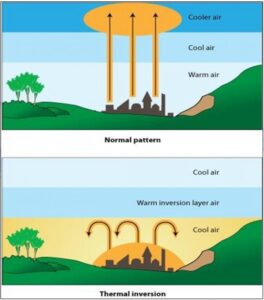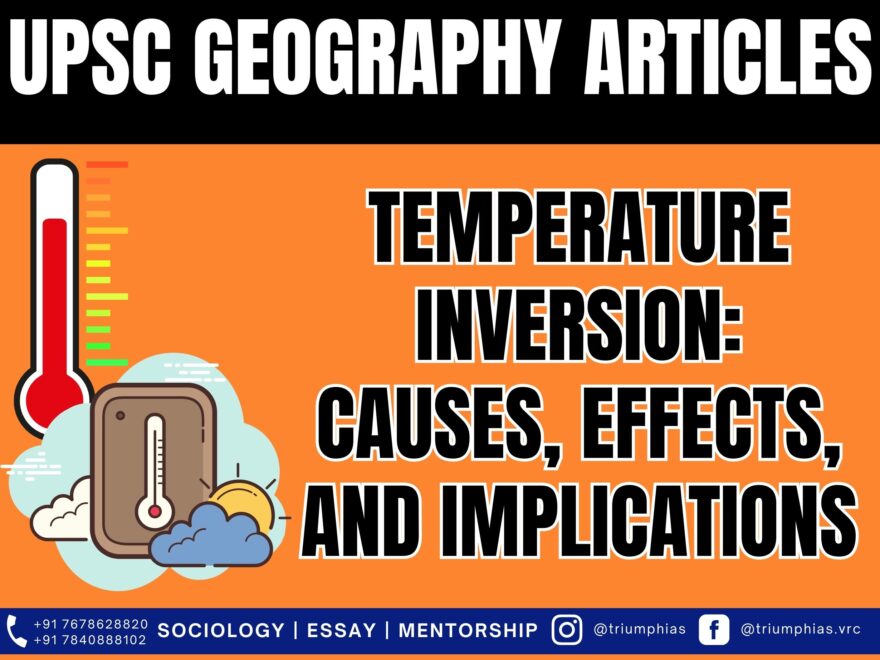Temperature Inversion
(Relevant for Geography Section of General Studies Paper Prelims/Mains)

Temperature inversion
Temperature inversion is an anomaly in the typical temperature patterns within the troposphere. In this meteorological occurrence, a stratum of warm air rests above a layer of cold air.
This phenomenon arises primarily under stable atmospheric conditions, although it can occasionally occur due to either horizontal or vertical air movements.
Typically, temperature inversions are relatively short-lived but remain a relatively frequent atmospheric event.
Favourable conditions for temperature inversion
- Extended winter nights: During long winter nights, the ground surface emits heat through terrestrial radiation, which can surpass the incoming solar radiation.
- Unclouded and transparent skies: The absence of clouds and clear skies enables a swifter loss of heat through terrestrial radiation without any hindrance.
- Low humidity near the surface: Dry air in proximity to the ground restricts the absorption of radiated heat emanating from the Earth’s surface.
- Lack of air movement: Slow-moving air impedes the transfer and mingling of heat within the lower atmospheric layers.
- Ground surface covered with snow: A snow-covered ground surface amplifies the loss of heat through the reflection of incoming solar radiation.
Effects on atmosphere and weather
- Temperature inversion plays a pivotal role in determining precipitation patterns, cloud formations, and even frost occurrence due to the cooling and subsequent condensation of warm air.
- Presence of suspended dust particles: During temperature inversion, airborne pollutants like dust particles and smoke fail to disperse effectively near the surface.
- Inhibition of air movement: Temperature inversion results in atmospheric stability, preventing both upward and downward air movements.
- Reduced rainfall: The limited upward movement of convection clouds leads to decreased rainfall and a dearth of showers, posing challenges for agricultural productivity.
- Reduced visibility: The formation of fog due to the juxtaposition of warm air above and cold air below reduces visibility, disrupting transportation.
- Thunderstorms and tornadoes: The inversion of temperature can contribute to intense thunderstorms and tornadoes, driven by the release of substantial energy when inversion disrupts the typical convection patterns in an area.
- Minimal diurnal temperature fluctuations: Temperature variations over the course of a day tend to be minimal in such conditions.
To conclude, temperature inversion might be desirable phenomena when it comes to cooler air temperatures, and comfort after an extremely hot and oppressive day, the after-effects on air quality are certainly not desirable.
Sample Question for UPSC Sociology Optional Paper:
1. Question: What is temperature inversion, and how does it affect socio-economic activities?
Answer: Temperature inversion is an atmospheric condition where warm air traps cold air near the Earth’s surface, contrary to the usual pattern in the troposphere. This condition can affect socio-economic activities by reducing agricultural productivity due to limited rainfall, disrupting transportation due to reduced visibility from fog, and affecting air quality.
2. Question: Discuss the role of temperature inversion in the formation of fog and its social implications.
Answer: Temperature inversion can lead to the formation of fog when warm air traps a layer of cold, moist air near the ground. This can have social implications by reducing visibility, affecting transportation safety, and even causing school and work delays.
3. Question: How does temperature inversion contribute to air pollution?
Answer:
During a temperature inversion, the trapped cold air near the surface limits the dispersion of airborne pollutants like dust particles and smoke, thereby contributing to worsened air quality.
4. Question: Explain how temperature inversion can affect precipitation patterns and its implications for agriculture.
Answer: Temperature inversion limits the upward movement of air, thus hindering the formation of convection clouds and resulting in decreased rainfall. This can pose significant challenges for agricultural productivity, especially in regions dependent on regular rainfall patterns.
5. Question: How do the conditions that favor temperature inversion vary with seasons?
Answer: Conditions favorable for temperature inversion, such as extended winter nights and low humidity, can be more prevalent in winter than in other seasons, thereby affecting weather patterns and air quality differently throughout the year.
Related Blogs …
To master these intricacies and fare well in the Sociology Optional Syllabus, aspiring sociologists might benefit from guidance by the Best Sociology Optional Teacher and participation in the Best Sociology Optional Coaching. These avenues provide comprehensive assistance, ensuring a solid understanding of sociology’s diverse methodologies and techniques.
Temperature inversion, troposphere, weather patterns, air quality, atmospheric conditions, precipitation, ground surface, winter nights, fog, thunderstorms, meteorology, troposphere and weather, atmospheric conditions, occasionally
Choose The Best Sociology Optional Teacher for IAS Preparation?
At the beginning of the journey for Civil Services Examination preparation, many students face a pivotal decision – selecting their optional subject. Questions such as “which optional subject is the best?” and “which optional subject is the most scoring?” frequently come to mind. Choosing the right optional subject, like choosing the best sociology optional teacher, is a subjective yet vital step that requires a thoughtful decision based on facts. A misstep in this crucial decision can indeed prove disastrous.
Ever since the exam pattern was revamped in 2013, the UPSC has eliminated the need for a second optional subject. Now, candidates have to choose only one optional subject for the UPSC Mains, which has two papers of 250 marks each. One of the compelling choices for many has been the sociology optional. However, it’s strongly advised to decide on your optional subject for mains well ahead of time to get sufficient time to complete the syllabus. After all, most students score similarly in General Studies Papers; it’s the score in the optional subject & essay that contributes significantly to the final selection.
“A sound strategy does not rely solely on the popular
Opinion of toppers or famous YouTubers cum teachers.”
It requires understanding one’s ability, interest, and the relevance of the subject, not just for the exam but also for life in general. Hence, when selecting the best sociology teacher, one must consider the usefulness of sociology optional coaching in General Studies, Essay, and Personality Test.
The choice of the optional subject should be based on objective criteria, such as the nature, scope, and size of the syllabus, uniformity and stability in the question pattern, relevance of the syllabic content in daily life in society, and the availability of study material and guidance. For example, choosing the best sociology optional coaching can ensure access to top-quality study materials and experienced teachers. Always remember, the approach of the UPSC optional subject differs from your academic studies of subjects. Therefore, before settling for sociology optional, you need to analyze the syllabus, previous years’ pattern, subject requirements (be it ideal, visionary, numerical, conceptual theoretical), and your comfort level with the subject.
This decision marks a critical point in your UPSC – CSE journey, potentially determining your success in a career in IAS/Civil Services. Therefore, it’s crucial to choose wisely, whether it’s the optional subject or the best sociology optional teacher. Always base your decision on accurate facts, and never let your emotional biases guide your choices. After all, the search for the best sociology optional coaching is about finding the perfect fit for your unique academic needs and aspirations.
To master these intricacies and fare well in the Sociology Optional Syllabus, aspiring sociologists might benefit from guidance by the Best Sociology Optional Teacher and participation in the Best Sociology Optional Coaching. These avenues provide comprehensive assistance, ensuring a solid understanding of sociology’s diverse methodologies and techniques. Sociology, Social theory, Best Sociology Optional Teacher, Best Sociology Optional Coaching, Sociology Optional Syllabus.
Best Sociology Optional Teacher, Sociology Syllabus, Sociology Optional, Sociology Optional Coaching, Best Sociology Optional Coaching, Best Sociology Teacher, Sociology Course, Sociology Teacher, Sociology Foundation, Sociology Foundation Course, Sociology Optional UPSC, Sociology for IAS,
Follow us :
🔎 https://www.instagram.com/triumphias
🔎https://www.youtube.com/c/TriumphIAS
https://t.me/VikashRanjanSociology
Find More Blogs
|
Scope of the subject and comparison with other social sciences |
|||
|
|
|
|
Modernity and social changes in Europe |

